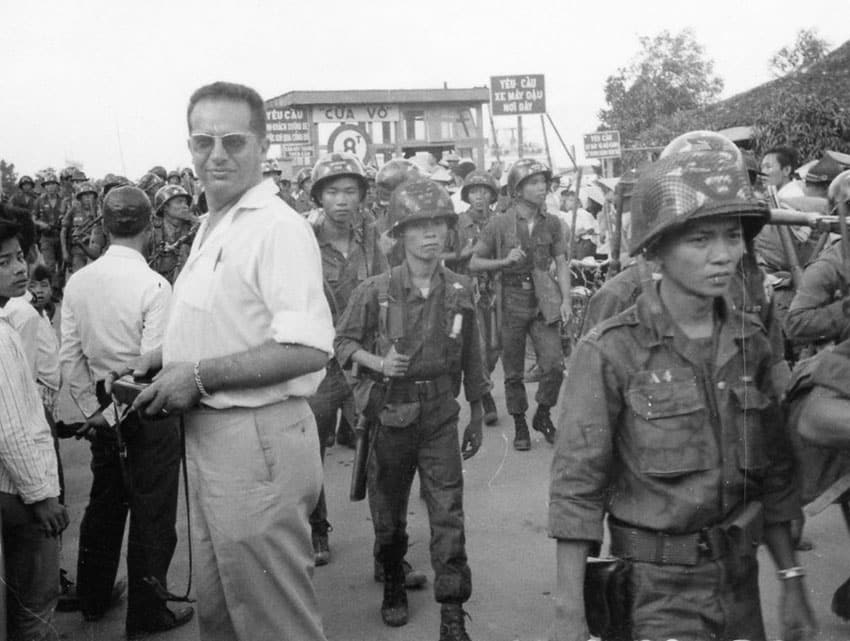Bernard Fall, a scholar and war correspondent, was an expert in gathering information about combat in the field, near the front lines, where the fighting was going on. He had done a lot of this work in the former French colony of Indochina, where he witnessed the French fighting a losing battle against Vietnamese insurgents, leading up to their final defeat at Dien Bien Phu in 1954. In 1961, he wrote a classic account of how French commanders had tried to cope with the Viet Minh: Street Without Joy.
Fall was convinced that only new military strategies, combined with economic aid and local political reforms, could defeat successful insurgencies like those he had observed against the French. He believed that the United States could not defeat Communist insurgents in Vietnam by conventional military means, and that the Vietnamese victory at Dien Bien Phu should serve as a lesson to the United States.
However, Fall’s warnings were ignored by Washington policymakers in the 1950s and 1960s, who responded by thwarting his rise as a government contractor and terminating negotiations to employ him at the Royal School of Administration in Cambodia. In 1967, Fall was back on the Street Without Joy, as a journalist embedded with U.S. troops. On a patrol near Hué, he was dictating into a tape recorder when he stepped on a landmine that killed him and a Marine sergeant.
Despite being a thorn in the side of U.S. government officials, Fall’s insights and warnings have achieved some influence with the revival of counterinsurgency doctrine that has shaped recent American initiatives in Iraq and Afghanistan. Today, his writings remain signal contributions to military science from a different war, long ago, when perhaps the best of analysts dodged police surveillance at home to wage counterinsurgency abroad.
Fall’s authority on counterinsurgency issues stemmed largely from his dedication to gathering facts in the field, often at great personal risk. He traveled repeatedly in Vietnam after his first visit there as a graduate student in 1953, and he reported on the Vietnam War in the 1960s while with American troops. Based on his observations in Vietnam, and extensive interviews with participants in the French Indochina War (1946–1954), Fall’s many publications include two seminal critiques of French counterinsurgency strategy: Street Without Joy (1961) and Hell in a Very Small Place: The Siege of Dien Bien Phu (1966).
Through his reporting and public speaking, Fall sought to improve American counterinsurgency efforts against Communist insurgents in the newly independent nations of South Vietnam, Cambodia, and Laos. He stressed the limits of armed intervention and the need to address broader issues of economic development and political corruption that plagued the region.
Fall believed that the failure of American economic assistance to develop the competitive advantages of the local economy led to economic deterioration and a dependence on foreign aid that fueled local support for the insurgents. In Vietnam, despite the potential to cultivate export surpluses, the lack of local currency for local investment led to increasing imports of food and American consumer goods.
At the heart of Fall’s critique was the observation that the failure of land reform to allow more farmers to own the land they farmed would over time lead discontented farmers to support insurgents. In addition, the network of political organizations that Vietnamese communists created—through an administrative structure Fall called parallel hierarchies—was impossible to counter with military capability alone.
Fall’s insights have particular relevance today, as the U.S. military continues to grapple with insurgent groups in Iraq and Afghanistan. The lessons that he learned during the French Indochina War and the Vietnam War should serve as a warning that military capabilities and technologies are important but insufficient when complex politics and long-standing grievances motivate diverse populations to engage in conflict.
His insights into the limitations of military power and the importance of political and economic reform in counterinsurgency operations have had a lasting impact on military science. While his warnings and recommendations were not always heeded, his work remains a valuable contribution to our understanding of modern conflict. Today, as we face new challenges and conflicts, we can learn from Fall’s insights and continue to apply his lessons to find lasting solutions






